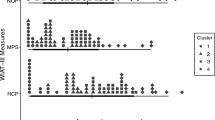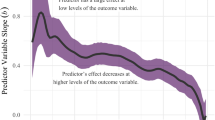Abstract
We are not well informed regarding the ability-achievement relationship for twice-exceptional individuals (very high cognitive ability and a diagnosed disability, e.g., autism spectrum disorder [ASD]). The research question for this investigation (N = 59) focused on the predictability of achievement among variables related to ability and education in a twice-exceptional sample of students (cognitive ability of 120 [91st percentile], or above, and diagnosed with ASD). We determined that WISC-IV Working Memory and Processing Speed Indices were both significantly positively correlated with achievement in math, reading, and written language. WISC Perceptual Reasoning Index was uniquely predictive of Oral Language test scores. Unexpected findings were that ASD diagnosis, Verbal Comprehension Index, and forms of academic acceleration were not related to the dependent variables.
Similar content being viewed by others
References
American Psychiatric Association. (2000). Diagnostic and statistical manual of mental disorders (4th ed., text rev.). Washington, DC: American Psychiatric Association.
Asperger, H. (1991). Autistic psychopathy in childhood. In U. Frith (Ed., Trans.). Autism and Asperger syndrome. Cambridge: Cambridge University Press (original work published in 1944).
Assouline, S. G., & Foley Nicpon, M. (2007). Twice-exceptional learners: Implications for the classroom. NAGC Communiqué Teaching for High Potential, Spring, 9–13.
Assouline, S. G., Foley Nicpon, M., & Doobay, A. (2009). Profoundly gifted girls and autism spectrum disorder: A psychometric case study comparison. Gifted Child Quarterly, 53(2), 89–106.
Beery, K. E., & Beery N. A. (2004). Beery VMI: Administration, scoring, and teaching manual. Minneapolis, MN: NCS Pearson.
Beery, K.E., Buktenica, N. A., & Beery, N. A. (2004). The Beery-Buktenica Developmental Test of Visual Motor Integration. Minneapolis, MN: NCS Pearson.
Bourdin, B., & Fayol, M. (1994). Is written language production more difficult than oral language production? A working memory approach. International Journal of Psychology, 29(5), 591–620.
Calhoun, S. L., & Mayes, S. D. (2005). Processing speed in children with clinical disorders. Psychology in the Schools, 42(4), 333–342.
Carretti, B., Borella, E., Cornoldi, C., & De Beni, R. (2009). Role of working memory in explaining the performance of individuals with specific reading comprehension difficulties: A meta-analysis. Learning and Individual Differences, 19(2), 245–251. doi:10.1016/j.lindif.2008.10.002.
Catts, H. W., Gillispie, M., Leonard, L. B., Kail, R. V., & Miller, C. A. (2002). The role of speed of processing, rapid naming, and phonological awareness in reading achievement. Journal of Learning Disabilities, 35(6), 510–525.
Colangelo, N., Assouline, S. G., & Gross, M. U. M. (2004). A nation deceived: How schools hold back America’s brightest students. Iowa City, IA: Belin-Blank Center.
Eaves, L. C., & Ho, H. H. (1997). School placement and academic achievement in children with autistic spectrum disorders. Journal of Developmental and Physical Disabilities, 9(4), 277–291.
Estes, A., Rivera, V., Bryan, M., Cali, P., & Dawson, G. (2011). Discrepancies between academic achievement and intellectual ability in higher-functioning school-aged children with autism spectrum disorder. Journal of Autism and Developmental Disorders, 41, 1044–1052. doi:10.1007/s10803-010-1127-3.
Foley Nicpon, M., Allmon, A., Sieck, R., & Stinson, R. D. (2011). Empirical investigation of twice-exceptionality: Where have we been and where are we going? Gifted Child Quarterly, 55(1), 3–17. doi:10.1177/0016986210382575.
Foley Nicpon, M., Assouline, S. G., & Stinson, R. D. (2012). Cognitive and academic profiles of gifted Students with autism or Asperger syndrome. Gifted Child Quarterly, 56(1).
Fuentes, C. T., Mostofsky, S. H., & Bastian, A. J. (2009). Children with autism show specific handwriting impairments. Neurology, 73(19), 1532–1537. doi:10.1212/WNL.0b013e3181c0d48c.
Harackiewicz, J. M., Barron, K. E., Tauer, J. M., & Elliot, A. J. (2002). Predicting success in college: A longitudinal study of achievement goals and ability measures as predictors of interest and performance from freshman year through graduation. Journal of Educational Psychology, 94(3), 562–575.
Jensen, A. R. (1998). The g factor: The science of mental ability. Westport, CT: Praeger.
Joseph, R. M., Tager-Flusberg, H., & Lord, C. (2002). Cognitive profiles and social-communicative functioning in children with autism spectrum disorder. Journal of Child Psychology and Psychiatry, 43(6), 807–821.
Kanner, L. (1943). Autistic disturbances of affective contact. Nervous Child, 2, 217–253.
Lord, C., Rutter, M., DiLavore, P. C., & Risi, S. (2003). Autism diagnostic observation schedule. Los Angeles, CA: Western Psychological Services.
Lubinski, D., Webb, R. M., Morelock, M. J., & Benbow, C. P. (2001). Top 1 in 10,000: A 10-year follow-up of the profoundly gifted. Journal of Applied Psychology, 86(4), 718–729.
Mayes, S. D., & Calhoun, S. L. (2003). Analysis of WISC-III, Stanford-Binet IV, and academic achievement tests scores in children with Autism. Journal of Autism and Developmental Disorders, 33(3), 329–341.
Mayes, S. D., & Calhoun, S. L. (2007). Learning, attention, writing, and processing speed in typical children and children with ADHD, autism, anxiety, depression, and oppositional-defiant disorder. Child Neuropsychology, 13, 469–493.
Meyer, J. A. (2001). Cognitive patterns in autism spectrum disorders. Assessment for Effective Intervention, 27, 27–35.
Myles, B. S., Barnhill, G. P., Hagiwara, T., Griswold, D. E., & Simpson, R. L. (2001). A synthesis of studies on the intellectual, academic, social/emotional and sensory characteristics of children and youth with Asperger syndrome. Education and Training in Mental Retardation and Developmental Disabilities, 36(3), 304–311.
Ozonoff, S., & Griffith, E. M. (2000). Neuropsychological function and the external validity of Asperger syndrome. In A. Klin, E. R. Volkmar, & S. Sparrow (Eds.), Asperger syndrome (pp. 72–96). New York: Guilford Press.
Raulerson, B. A., Donovan, M. J., Whiteford, A. P., & Kellogg, R. T. (2010). Differential verbal, visual, and spatial working memory in written language production. Perceptual and Motor Skills, 110(1), 229–244.
Rohde, T. E., & Thompson, L. A. (2007). Predicting academic achievement with cognitive ability. Intelligence, 35, 83–92.
Rowe, E. W., Kingsley, J. M., & Thompson, D. F. (2010). Predictive ability of the general ability index (GAI) versus the full scale IQ among gifted referrals. School Psychology Quarterly, 25(2), 119–128.
Rutter, M., Le Couteur, A., & Lord, C. (2003). Autism diagnostic interview-revised. Los Angeles, CA: Western Psychological Services.
Sansosti, F. J., Powell-Smith, K. A., & Cowan, R. J. (2010). Ausism/Asperger syndrome in schools: Assessment and intervention. New York, NY: Guilford Press.
Sattler, J. M. (2008). Assessment of children: Cognitive foundations (5th ed.). San Diego, CA: Jerome Sattler, Publisher, Inc.
Stephens, K. R. (2011). Federal and state response to the gifted and talented. Journal of Applied School Psychology, 27(4), 306–318.
Swanson, H. L. (2011). The influence of working memory growth on reading and math performance in children with math and/or reading disabilities. In P. Barrouillet & V. Gaillard (Eds.), Cognitive development and working memory: A dialogue between neo-Piagetian theories and cognitive approaches (pp. 203–231). New York: Psychology Press.
Swanson, H. L., Zheng, Z., & Jerman, O. (2009). Working memory, short-term memory, and reading disabilities: A selective meta-analysis of the literature. Journal of Learning Disabilities, 42(3), 260–287.
Volkmar, F. R., & Klin, A. (2000). Diagnostic issues in Asperger syndrome. In A. Klin, F. R. Volkmar, & S. S. Sparrow (Eds.), Asperger syndrome. New York, NY: Guilford Press.
Wechsler, D. (1997). Wechsler adult intelligence scale (3rd ed.). San Antonio, TX: The Psychological Corporation.
Wechsler, D. (2003). Wechsler intelligence scale for children (4th ed.). San Antonio, TX: The Psychological Corporation.
Witwer, A. N., & Lecavalier, L. (2008). Examining the validity of autism spectrum disorder subtypes. Journal of Autism and Developmental Disorders, 38, 1611–1624.
Woo, S. M., & Keatinge, C. (2008). Diagnosis and treatment of mental disorders across the lifespan. Hoboken, NJ: Wiley.
Woodcock, R. W., McGrew, K. S., & Mather, N. (2001). Woodcock-Johnson III tests of cognitive ability. Itasca, IL: Riverside.
Acknowledgments
The authors gratefully acknowledge the students and parents who participated in the research through the Assessment and Counseling Clinic of The University of Iowa Belin-Blank Center for Gifted and Talented Education. The authors gratefully acknowledge the support of the Belin-Blank Center.
Author information
Authors and Affiliations
Corresponding author
Rights and permissions
About this article
Cite this article
Assouline, S.G., Foley Nicpon, M. & Dockery, L. Predicting the Academic Achievement of Gifted Students with Autism Spectrum Disorder. J Autism Dev Disord 42, 1781–1789 (2012). https://doi.org/10.1007/s10803-011-1403-x
Published:
Issue Date:
DOI: https://doi.org/10.1007/s10803-011-1403-x




